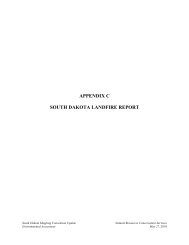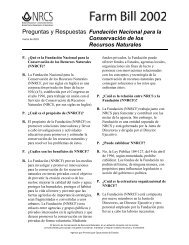The Ozette Prairies of Olympic National Park - Natural Resources ...
The Ozette Prairies of Olympic National Park - Natural Resources ...
The Ozette Prairies of Olympic National Park - Natural Resources ...
You also want an ePaper? Increase the reach of your titles
YUMPU automatically turns print PDFs into web optimized ePapers that Google loves.
support their existing flora or parts <strong>of</strong> it (Clayton Antieau pers. comm. 2009; Graber 2003; Whitlock 1992).<br />
Ecologist David Graber (2003:264) says that “moreover, applications <strong>of</strong> previously benign or positive<br />
management practices, such as the relatively light and local burning programs Native Americans practiced<br />
for many years...now may produce undesirable, less ‘natural’ outcomes, or may simply be inadequate<br />
to mitigate anthropogenic stressors.”<br />
It is unknown how the Makah copper and the <strong>Ozette</strong> skipper may respond to fire. <strong>The</strong> ecological<br />
literature demonstrates that using fire to maintain prairie and wetland habitat for rare and endangered<br />
butterflies can be either beneficial or detrimental to the populations <strong>of</strong> the insects (Black et al. 2009; Swengel<br />
1996; Schultz and Crone 1998; Panzer 2002). We don’t know enough about these particular butterflies,<br />
however, to assign them to either category.<br />
Butterfly expert Robert Michael Pyle is against the reintroduction <strong>of</strong> fire in the <strong>Ozette</strong> <strong>Prairies</strong>, but<br />
he recognizes the importance <strong>of</strong> open habitat for the welfare <strong>of</strong> the butterflies and recommends mechani-<br />
cal removal <strong>of</strong> the trees:<br />
Although major fire scars on the south sides <strong>of</strong> the large ‘cypress-like’ hemlocks<br />
in S. Ahlstrom’s Prairie show that fire has been an ecological feature <strong>of</strong> the area, we<br />
recommend against employing fire to reduce biomass on the <strong>Ozette</strong> <strong>Prairies</strong>. A large<br />
body <strong>of</strong> evidence is building that indicates fire is hostile to butterfly populations unless<br />
a large area <strong>of</strong> adjacent habitat remains unburned to permit refuge and recolonization.<br />
<strong>The</strong> gentian, the violets, the copper, the skippers, and their host plants, bog cranberry<br />
and grasses, will all be better served through small tree cutting than by fire, which<br />
could extirpate them. On the other hand, fire at Roose’s homestead appears to represent<br />
no threat, unless it escapes onto Roose’s Bog (R. Pyle and T. Pyle 2000).<br />
Fire ecologist James Agee (pers. comm. 2009) says that:<br />
Another alternative to consider in active management <strong>of</strong> the <strong>Ozette</strong> <strong>Prairies</strong> is<br />
to mechanically remove the trees and then reintroduce fire to portions <strong>of</strong> the prairies<br />
every few years. This should mitigate the butterfly impact and in the long run increase<br />
habitat for them.<br />
Bog ecologist Richard Hebda states:<br />
<strong>The</strong>re are multiple factors involved with tree encroachment on the <strong>Ozette</strong> <strong>Prairies</strong><br />
and yes absence <strong>of</strong> fire has likely played a role and grazing changes too. My recommendation<br />
would be to do some limited experimental fires at the margins <strong>of</strong> one <strong>of</strong> the<br />
wet areas and see what happens. Fire can have negative effects on wetlands increasing<br />
nutrient fluxes, reducing rate <strong>of</strong> peat formation, especially in Sphagnum areas,<br />
perhaps changing hydrology in the wetland itself so caution is warranted. Cutting<br />
out the trees may also be an effective approach if the tree cover is the key element <strong>of</strong> the<br />
hydrological processes.<br />
62
















